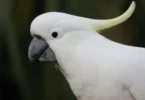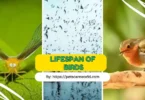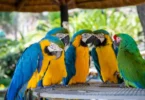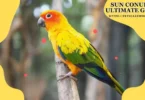Watermelon is a refreshing summer fruit that many people enjoy, but what about our feathered friends? In this article, we will explore whether it is safe for birds to eat watermelon, including seeds and rinds. We will find an answer to ‘Can Birds Eat Watermelon? We will also discuss which bird species can safely consume this juicy treat and how to feed it to them.
Is watermelon safe for birds to eat?
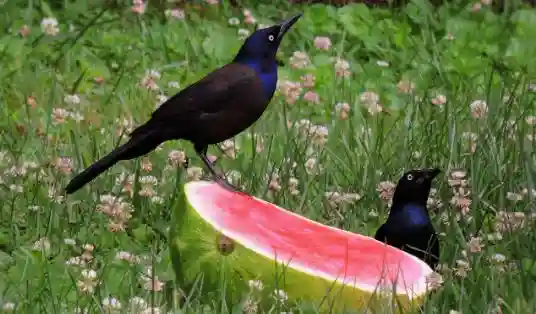
Many birds can indeed enjoy the delicious taste of watermelon. It provides hydration and essential nutrients, making it a healthy snack option. However, it is important to ensure that the watermelon is fresh and free from any pesticides or chemicals that could harm the birds.
Can birds eat watermelon seeds?
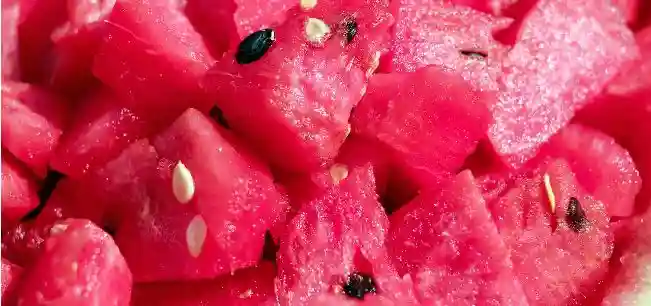
Birds, such as pigeons, doves, and sparrows, can consume watermelon seeds without any issues. They might even find them a tasty and nutritious treat. These seeds are typically small and pose no harm to birds when consumed in moderation. However, it’s important to avoid feeding them in excessive quantities, as they may cause digestive issues.
Is watermelon toxic to birds?
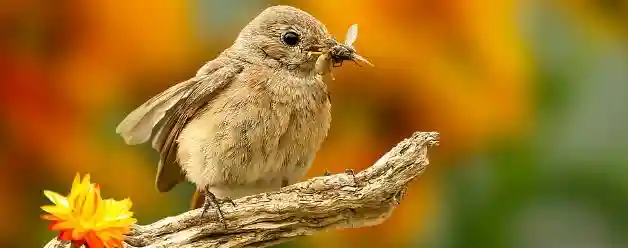
Watermelon itself is not toxic to birds. It is a safe and healthy fruit for them to consume. However, certain parts of the watermelon, such as the seeds and rinds, may present potential risks if not fed in moderation or if not prepared properly.
Can birds eat watermelon rinds?

While birds can technically eat watermelon rinds, it’s important to be cautious. The rinds can be tough for birds to digest, especially for smaller species. It is recommended to remove the green outer rind and only provide the birds with the fleshy, red part of the watermelon. This ensures easier consumption and minimizes the risk of digestive issues.
Is watermelon toxic to parrots?

Parrots can safely consume watermelon, including the flesh, seeds, and rind, as long as it is served in moderation. However, it’s important to remove any seeds that could pose a choking hazard. Additionally, it’s important to note that a balanced diet consisting of various fruits and vegetables is essential for the overall health of parrots.
Is watermelon okay for Crows?
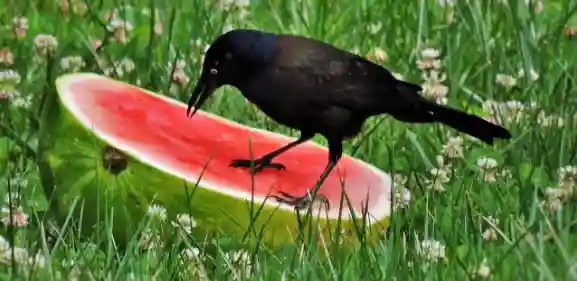
Crows can enjoy watermelon as a part of their diet. They find the sweetness of the fruit appealing and it can serve as a great source of hydration for them. However, it’s best to serve watermelon in small pieces, making it easier for crows to consume.
Is watermelon good for lovebirds?
Lovebirds can consume watermelon in moderation. The juicy fruit can be a delicious and refreshing treat for them. However, it’s important to offer it sparingly, as too much watermelon can cause an upset stomach in lovebirds due to its high water content.
Can cockatiels eat watermelon?
Cockatiels can safely consume watermelon as long as it is prepared correctly. Like other birds, the seeds should be removed to prevent any potential choking hazards. The flesh of the watermelon can be cut into small pieces and provided to the cockatiels as a treat or as a way to keep them hydrated during hot weather.
Do hummingbirds eat watermelons?

Hummingbirds primarily feed on nectar from flowers, so watermelon is not a natural part of their diet. While they may not typically seek out watermelon, they might be attracted to the sweet juices if offered. However, it’s important to remember that their main source of nutrition should come from nectar or specially formulated hummingbird food.
How Do You Feed Watermelon to Birds?
When feeding watermelon to birds, it’s important to follow a few guidelines. Ensure that the watermelon is ripe and free from any chemicals. Cut the flesh into bite-sized pieces, removing seeds if necessary. Place the watermelon pieces in a shallow dish or on a bird feeder, making them easily accessible for the birds. Observe the birds while they feed to ensure they are consuming it properly.
Are there any bird species that can’t have watermelon?
While many bird species can enjoy watermelon, certain birds should avoid it. Birds such as parakeets, canaries, and finches have specialized diets and may not be able to digest watermelon properly. It is always best to research the specific dietary needs of each bird species before introducing new foods.
What kind of birds eat watermelon?
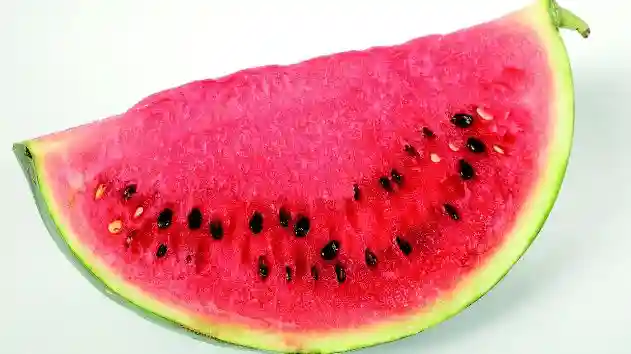
Several bird species are known to occasionally eat watermelon, especially if it’s ripe and cut into manageable pieces. Some of these birds include:
American Robins: These birds are known to eat a variety of fruits, including watermelon, especially during the summer months.
- Primarily insectivorous, they enjoy ripe fruits during the summer.
- Watermelon can be a refreshing and hydrating treat for them.
Cedar Waxwings: These birds are highly frugivorous, which means they primarily feed on fruits. They are often attracted to watermelon pieces.
- Highly frugivorous, meaning they mainly eat fruits.
- Watermelon’s sweetness can attract them, especially when it’s available.
European Starlings: While not a native species to North America, European Starlings are adaptable and opportunistic feeders. They might be seen nibbling on watermelon.
- Not native to North America but adaptable feeders.
- They might try watermelon if it’s around.
Northern Mockingbirds: These birds have a diverse diet that includes fruits, and they might be observed pecking at watermelon slices.
- omnivorous, with a preference for fruits and insects.
- Watermelon can be part of their varied diet.
House Sparrows: Although they primarily feed on seeds, house sparrows are known to sample a variety of foods, including watermelon.
- Generally seed-eaters, but can be opportunistic.
- Watermelon might pique their interest occasionally.
Blue Jays: While not a common occurrence, blue jays have been known to eat watermelon on occasion.
- Known for eating a diverse range of foods.
- While not a common choice, some might sample watermelon.
Gray Catbirds: These birds are part of the thrush family and are known to eat various fruits, including watermelon.
- Part of the thrush family and often enjoy fruits.
- Watermelon could be part of their foraging repertoire.
Considerations for Offering Watermelon to Birds
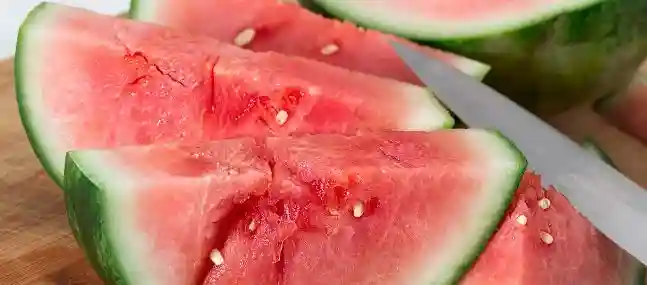
- Nutritional Variety
- Watermelon should be offered as a supplement, not a primary diet.
- Birds require a balanced diet with a mix of proteins, carbohydrates, and fats.
- Feeding Techniques
- Cut watermelon into manageable pieces to make it easier for birds to consume.
- Providing watermelon in a bird feeder or on a flat surface can attract different species.
- Hydration in Summer
- Watermelon’s high water content can help birds stay hydrated during hot months.
- Placing watermelon near a water source can encourage birds to visit.
- Quality and Safety
- Use organic watermelon, free from pesticides or chemicals.
- Remove seeds to prevent potential choking hazards.
- Observation and Enjoyment:
- Bird-watching can be an enjoyable and educational activity for all ages.
- Observing bird behavior around watermelon can offer insights into their dietary preferences.
Watermelon and its Nutrition
Watermelon (Citrullus lanatus) is a juicy and refreshing fruit that belongs to the Cucurbitaceae family. It’s known for its high water content and sweet, juicy flesh, making it a popular choice, especially during hot weather. Here’s a brief overview of its nutritional content:
Hydration: Watermelon is composed of about 90% water, which makes it a great natural hydrator, especially in warm climates.
Calories and Macronutrients: Watermelon is relatively low in calories, with about 30 calories per 100 grams. It contains minimal fat and protein.
Carbohydrates: The main carbohydrate in watermelon is natural sugars, primarily in the form of fructose.This contributes to its sweet taste.
Vitamins and Minerals: Watermelon is a good source of vitamins A and C. It contains small amounts of B vitamins like B1 (thiamine), B5 (pantothenic acid), and B6 (pyridoxine). The fruit also provides minerals such as potassium and magnesium.
Antioxidants: Watermelon contains antioxidants like lycopene, which gives it its vibrant red color. Lycopene is linked to various health benefits, including potential protection against certain diseases.
Amino Acids: Watermelon contains the amino acid citrulline, which has been studied for its potential benefits for blood flow and cardiovascular health.
Fiber: While watermelon is not particularly high in fiber, it does contain some dietary fiber that can aid digestion.
Health Benefits: Due to its high water content and hydration benefits, watermelon can help quench thirst and maintain fluid balance. The antioxidants, vitamins, and minerals in watermelon contribute to overall health and well-being.
Moderation and Nutritional Diversity: Watermelon is nutritious, but consume it as part of a balanced diet. Including a variety of fruits, vegetables, whole grains, lean proteins, and healthy fats provides a wide range of nutrients.
Considerations: Watermelon’s natural sugars can elevate blood sugar levels, so individuals with diabetes should consume it in moderation. Some people might have allergies or sensitivities to certain compounds in watermelon.
Interesting Fun Facts
- Watermelon contains about 92% water, making it a hydrating snack for birds.
- Birds often help with seed dispersal, so if a bird consumes watermelon, it may later deposit the seeds elsewhere, aiding in plant growth.
- The bright red color of watermelon flesh is due to the pigment lycopene, which is also beneficial for bird health.
Conclusions
Many birds can safely enjoy watermelon as part of their diet. As with any food, moderation is key, and it is best to remove seeds to prevent choking hazards. Watermelon can provide hydration and essential nutrients for birds, making it a delightful and healthy treat when served correctly.
Frequently Asked Questions (FAQs)
-
Can birds eat watermelon seeds?
Yes, many birds can consume watermelon seeds without any issues. However, it’s important to offer them in moderation.
-
Is watermelon toxic to parrots?
Watermelon is not toxic to parrots. However, it’s important to remove any seeds that could pose a choking hazard.
-
Can hummingbirds eat watermelon?
While watermelon is not a natural part of their diet, hummingbirds may be attracted to the sweet juices if offered. However, their main source of nutrition should still come from nectar or specially formulated hummingbird food.
-
Is watermelon good for lovebirds?
Yes, lovebirds can eat watermelon in moderation.
Remove the seeds and cut the fruit into small, bite-sized pieces.
Watermelon’s high water content can help keep them hydrated.
However, remember that watermelon should only be part of a balanced diet. -
Can cockatiels eat watermelon?
Yes, cockatiels can enjoy watermelon as an occasional treat.
Remove the seeds and cut the fruit into appropriate sizes.
Introduce new foods gradually to prevent digestive issues.
Always ensure that watermelon is fresh and free from pesticides. -
How should I offer watermelon to my birds?
Cut the watermelon into small pieces that are easy for the birds to eat.
Place the watermelon pieces in a dish or attach them to a bird feeder.
Remember, watermelon should be a supplement to their regular diet, not a replacement. -
Can watermelon replace my birds’ regular food?
No, watermelon should not replace your birds’ regular, balanced diet.
Birds have specific nutritional requirements, and a variety of foods is essential for their health. -
Are there any risks to feeding watermelon to birds?
Watermelon is generally safe for many bird species when given in moderation.
Avoid offering watermelon seeds, as they can be a choking hazard. -
How often can I give watermelon to my birds?
Watermelon can be offered as an occasional treat.
1-2 times a week is generally a safe frequency. -
What other foods should I include in my birds’ diet?
Offer a balanced diet that includes high-quality bird pellets, fresh vegetables, fruits, and occasional protein sources like boiled eggs.
-
How do I know if my birds like watermelon?
Watch their behavior. If they show interest, peck at the pieces, and seem to enjoy the taste, it’s likely they like it.
-
Are there any fruits I should avoid feeding my birds?
Avoid feeding avocados, as they can be toxic to birds.
Citrus fruits should also be given sparingly due to their acidity. -
Can I feed watermelons to wild birds?
While offering some fruits can be fine, it’s generally better to provide foods that mimic their natural diet, like seeds and insects. – Consult local birding experts for advice on supporting wild bird populations.

